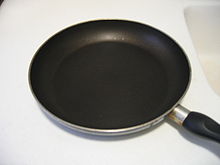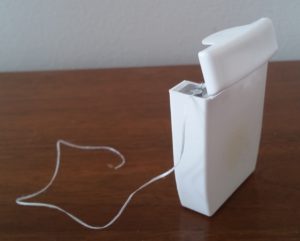 For years stores and manufacturers have promoted the advantages of Scotchgard and Teflon nonstick coatings for pots and pans, as stain-proofing for upholstered furniture and rugs, as a water repellent for clothing, for consumer goods such as dental floss, and for grease-proof food wrappers and containers. And yes, people have been convinced - with most cookware sold today being of the nonstick type, and the popularity of sofas and rugs coated with non-stain coatings. But once again, chemicals come with a price and health effects, and unfortunately these particular chemicals are found in all of us in varying levels.
For years stores and manufacturers have promoted the advantages of Scotchgard and Teflon nonstick coatings for pots and pans, as stain-proofing for upholstered furniture and rugs, as a water repellent for clothing, for consumer goods such as dental floss, and for grease-proof food wrappers and containers. And yes, people have been convinced - with most cookware sold today being of the nonstick type, and the popularity of sofas and rugs coated with non-stain coatings. But once again, chemicals come with a price and health effects, and unfortunately these particular chemicals are found in all of us in varying levels.
Polyfluorinated chemicals (PFCs) are a class of chemicals that are stain, water, and grease repellent chemicals.They have been found in the blood of more than 98% of the United States population. PFCs stay in the environment and body for many years (thus labeled as "persistent"). Some PFCs: perfluorooctanoic acid, or PFOA, perfluorooctane sulfonate or PFOS, perfluorononanoic acid or PFNA, and perfluorohexane sulfonate or PFHxS.
PFOA was used to make DuPont's popular Teflon coating for decades. DuPont phased out its PFOA production after a settlement with federal regulators (it was linked it to birth defects and cancer in animals). But meanwhile PFOA spread worldwide, and traces of the compound have been found in most people, in polar bears in the Arctic, in some drinking water, and even in some fish. PFCs pass from mothers to their babies during pregnancy, and in breast milk after birth. They are considered hazardous even in small doses, they accumulate, and have been linked to all sorts of medical problems, from developmental delays in the fetus and child, to immune problems, kidney disease, kidney and testicular cancers, and to thyroid disease.
And once again, as some chemicals are phased out, the replacement chemicals may be just as bad. One group of replacement chemicals is perfluoroalkyl sulfonate (PFAS). Experts worry that this new group of PFASs has many of the same troubling characteristics as their predecessors, because of the chemical similarities with the original chemicals. But we won't know for years, because once again the necessary health tests have not been done.
What can you do to avoid PFCs? 1) Do not use Teflon or non-stick pots, pans, and utensils. Use stainless steel or cast iron instead. 2) Avoid Scotchgard or other stain-proofing or stain-resistant treatments on upholstered furniture or rugs. 3) Avoid jackets, rain gear, or other clothing with "water resistant" or "stain resistant" treatments. 4) Try to cut back on foods that come in "grease-proof" containers. Don't use microwave popcorn bags. 5) Don't use dental floss such as Oral-B Glide dental floss (uses PFC), and use unwaxed or natural wax floss instead (such as Toms of Maine floss). 6) Avoid personal care products that contain ingredients that include the words “fluoro” or “perfluoro.
From Medscape: Prenatal Exposure to Household Chemicals Hurts Kids' Cognition
Exposure to common household chemicals such as those found in nonstick cooking pans, upholstery, carpet pads, and electronics during pregnancy may lead to poorer cognitive and behavioral development during childhood, new research shows.
In an analysis of more than 250 mother-child pairs, maternal exposure to polybrominated diphenyl ethers (PBDEs) and perfluoroalkyl substances (PFASs) was associated with impairments in executive function in children aged 5 and 8 years. "These findings suggest that concentrations of maternal serum PBDEs and PFASs during pregnancy may be associated with poorer executive function in school-age children," the investigators, with first author Ann Vuong, DrPH,...."Given that the persistence of PBDEs and PFASs has resulted in detectable serum concentrations worldwide, the observed deficits in executive function may have a large impact at the population level," they add.
In-unit increases in PFOS levels were associated with worse behavior regulation, poorer metacognition, and poorer global executive functioning. No link was found between PFOA levels and executive function. Dr Vuong told Medscape Medical News that although the majority of PBDEs and PFASs have been phased out of products, there is an ongoing risk of exposure."It's in the environment, and probably it's that people have already purchased products within their homes, and everyone has [PBDEs] in their bodies. So the only way to reduce the body burden or exposure is through cleaning methods," she said.
For PBDEs, it is recommended that people regularly use a high-efficiency particulate air (HEPA) filter in their vacuum and that they wipe down surfaces and regularly wash their hands. "For PFASs, it's recommended that you try not to, or limit your use of, microwaved fast food packaging, as well as trying not to use deteriorated pans with nonstick coatings," Dr Vuong added....Although reducing exposure to substances with known neurodevelopmental and cognitive risks is important, Dr Vuong emphasized that the chemicals have been replaced by novel compounds, some of which may carry their own risks.
UPDATE: 2 new articles discussing this issue: New Teflon Toxin Causes Cancer in Lab Animals and How Dupont Concealed the Dangers of the New Teflon Toxin



 Dental floss coated with a "non-stick coating" has long been a concern of mine. Do the Teflon-like chemicals get into the person when a person is flossing teeth?
Dental floss coated with a "non-stick coating" has long been a concern of mine. Do the Teflon-like chemicals get into the person when a person is flossing teeth? Another study is adding to the evidence that food packaging is frequently coated with harmful chemicals - called perfluorinated chemicals or PFCs. The chemicals are used because they resist grease and stains, but unfortunately they then leach into the food, and when people eat the food - it gets into them. The evidence is also growing that these chemicals have all sorts of harmful health effects, including endocrine disruption (they are
Another study is adding to the evidence that food packaging is frequently coated with harmful chemicals - called perfluorinated chemicals or PFCs. The chemicals are used because they resist grease and stains, but unfortunately they then leach into the food, and when people eat the food - it gets into them. The evidence is also growing that these chemicals have all sorts of harmful health effects, including endocrine disruption (they are  For years stores and manufacturers have promoted the advantages of Scotchgard and Teflon nonstick coatings for pots and pans, as stain-proofing for upholstered furniture and rugs, as a water repellent for clothing, for consumer goods such as dental floss, and for grease-proof food wrappers and containers. And yes, people have been convinced - with most cookware sold today being of the nonstick type, and the popularity of sofas and rugs coated with non-stain coatings. But once again, chemicals come with a price and health effects, and unfortunately these particular chemicals are found in all of us in varying levels.
For years stores and manufacturers have promoted the advantages of Scotchgard and Teflon nonstick coatings for pots and pans, as stain-proofing for upholstered furniture and rugs, as a water repellent for clothing, for consumer goods such as dental floss, and for grease-proof food wrappers and containers. And yes, people have been convinced - with most cookware sold today being of the nonstick type, and the popularity of sofas and rugs coated with non-stain coatings. But once again, chemicals come with a price and health effects, and unfortunately these particular chemicals are found in all of us in varying levels.